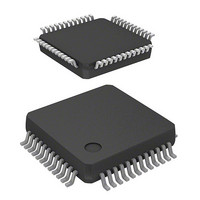R5F21217JFP#U1 Renesas Electronics America, R5F21217JFP#U1 Datasheet - Page 29

R5F21217JFP#U1
Manufacturer Part Number
R5F21217JFP#U1
Description
MCU FLASH 48K 2.5K CMOS 48LQFP
Manufacturer
Renesas Electronics America
Series
R8C/2x/21r
Datasheet
1.R5F21216JFP.pdf
(503 pages)
Specifications of R5F21217JFP#U1
Core Processor
R8C
Core Size
16/32-Bit
Speed
20MHz
Connectivity
I²C, LIN, SIO, SSU, UART/USART
Peripherals
POR, Voltage Detect, WDT
Number Of I /o
41
Program Memory Size
48KB (48K x 8)
Program Memory Type
FLASH
Ram Size
2.5K x 8
Voltage - Supply (vcc/vdd)
2.7 V ~ 5.5 V
Data Converters
A/D 12x10b
Oscillator Type
Internal
Operating Temperature
-40°C ~ 85°C
Package / Case
48-LQFP
Lead Free Status / RoHS Status
Lead free / RoHS Compliant
Eeprom Size
-
Available stocks
Company
Part Number
Manufacturer
Quantity
Price
Part Number:
R5F21217JFP#U1R5F21217JFP
Manufacturer:
Renesas Electronics America
Quantity:
10 000
- Current page: 29 of 503
- Download datasheet (6Mb)
R8C/20 Group, R8C/21 Group
Rev.2.00 Aug 27, 2008
REJ09B0250-0200
2.1
2.2
2.3
2.4
2.5
2.6
2.7
2.8
2.8.1
2.8.2
2.8.3
2.8.4
2.8.5
2.8.6
R0 is a 16-bit register for transfer, arithmetic, and logic operations. The same applies to R1 to R3.
R0 can be split into high-order bit (R0H) and low-order bit (R0L) to be used separately as 8-bit data registers. The
same applies to R1H and R1L as R0H and R0L. R2 can be combined with R0 to be used as a 32-bit data register
(R2R0). The same applies R3R1 as R2R0.
A0 is a 16-bit register for address register indirect addressing and address register relative addressing. They also
are used for transfer, arithmetic and logic operations. The same applies to A1 as A0.
A1 can be combined with A0 to be used a 32-bit address register (A1A0).
FB is a 16-bit register for FB relative addressing.
INTB, a 20-bit register, indicates the start address of an interrupt vector table.
PC, 20 bits wide, indicates the address of an instruction to be executed.
The stack pointer (SP), USP and ISP, are 16 bits wide each.
The U flag of FLG is used to switch between USP and ISP.
SB is a 16-bit register for SB relative addressing.
FLG is a 11-bit register indicating the CPU status.
The C flag retains a carry, borrow, or shift-out bit that has occurred in the arithmetic and logic unit.
The D flag is for debug only. Set to 0.
The Z flag is set to 1 when an arithmetic operation resulted in 0; otherwise, 0.
The S flag is set to 1 when an arithmetic operation resulted in a negative value; otherwise, 0.
The register bank 0 is selected when the B flag is 0. The register bank 1 is selected when this flag is set to 1.
The O flag is set to 1 when the operation resulted in an overflow; otherwise, 0.
Data Registers (R0, R1, R2 and R3)
Address Registers (A0 and A1)
Frame Base Register (FB)
Interrupt Table Register (INTB)
Program Counter (PC)
User Stack Pointer (USP) and Interrupt Stack Pointer (ISP)
Static Base Register (SB)
Flag Register (FLG)
Carry Flag (C)
Debug Flag (D)
Zero Flag (Z)
Sign Flag (S)
Register Bank Select Flag (B)
Overflow Flag (O)
Page 11 of 458
2. Central Processing Unit (CPU)
Related parts for R5F21217JFP#U1
Image
Part Number
Description
Manufacturer
Datasheet
Request
R

Part Number:
Description:
KIT STARTER FOR M16C/29
Manufacturer:
Renesas Electronics America
Datasheet:

Part Number:
Description:
KIT STARTER FOR R8C/2D
Manufacturer:
Renesas Electronics America
Datasheet:

Part Number:
Description:
R0K33062P STARTER KIT
Manufacturer:
Renesas Electronics America
Datasheet:

Part Number:
Description:
KIT STARTER FOR R8C/23 E8A
Manufacturer:
Renesas Electronics America
Datasheet:

Part Number:
Description:
KIT STARTER FOR R8C/25
Manufacturer:
Renesas Electronics America
Datasheet:

Part Number:
Description:
KIT STARTER H8S2456 SHARPE DSPLY
Manufacturer:
Renesas Electronics America
Datasheet:

Part Number:
Description:
KIT STARTER FOR R8C38C
Manufacturer:
Renesas Electronics America
Datasheet:

Part Number:
Description:
KIT STARTER FOR R8C35C
Manufacturer:
Renesas Electronics America
Datasheet:

Part Number:
Description:
KIT STARTER FOR R8CL3AC+LCD APPS
Manufacturer:
Renesas Electronics America
Datasheet:

Part Number:
Description:
KIT STARTER FOR RX610
Manufacturer:
Renesas Electronics America
Datasheet:

Part Number:
Description:
KIT STARTER FOR R32C/118
Manufacturer:
Renesas Electronics America
Datasheet:

Part Number:
Description:
KIT DEV RSK-R8C/26-29
Manufacturer:
Renesas Electronics America
Datasheet:

Part Number:
Description:
KIT STARTER FOR SH7124
Manufacturer:
Renesas Electronics America
Datasheet:

Part Number:
Description:
KIT STARTER FOR H8SX/1622
Manufacturer:
Renesas Electronics America
Datasheet:

Part Number:
Description:
KIT DEV FOR SH7203
Manufacturer:
Renesas Electronics America
Datasheet:











